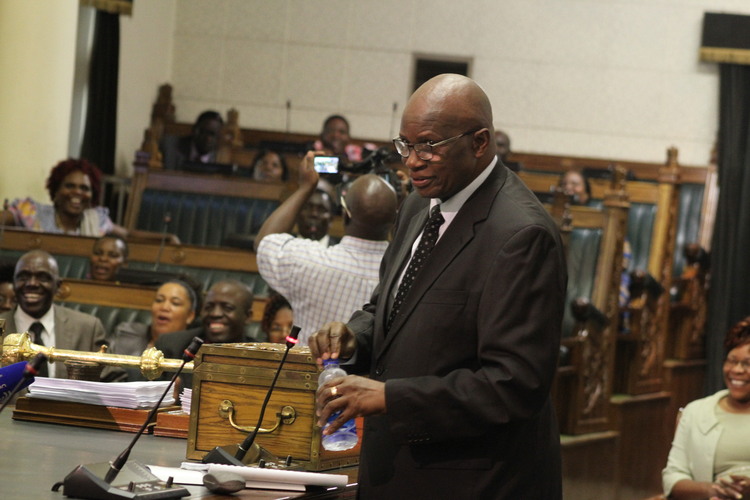
The Sunday Mail

It was the late Vice President Dr Joshua Nkomo who once said, “A people who love their Government will defend their Government.”
His context was in terms of military and armed struggle, but this statement is no less relevant and precise in economic struggle.
In recent weeks, we have heard both monetary and fiscal policy statements.
On the surface, many policies have been critiqued, examined and fairly scrutinised; as it should be for any progressive country.
Now maybe within our analyses we can add an assessment of the good faith that should exist for most of these policies to work.
By good faith I mean an overall trust and reciprocation that should exist between citizens and the institutions mandated to carry out most of the propositions put forward by our policy-makers.
Reserve Bank of Zimbabwe Governor Dr John Mangudya opened his monetary policy statement very well by sharing the sentiment that we are in this together.
He was likely cognisant that for monetary policy to work, citizens and financial institutions must maintain a level of trust.
For instance, it is in good faith that people open a bank account and further along maintain a continued relationship where they willingly make deposits or transact using facilities offered by financial institutions.
Good faith, however, is all the more important in terms of fiscal policy.
While monetary policy can allow a certain level of choice of participation to the regular citizen, fiscal policy tends to be dependent on mandatory participation.
Therefore, if taxpayers do not trust that their hard-earned money is truly being used to serve their interests or that assured stewardship of tax money is there, discontent grows within the taxpayer. In such a scenario fiscal objectives become compromised and much harder to achieve.
It is this good faith that taxpayers deserve that Finance Minister Patrick Chinamasa should take heed of and elevate his concerns.
I am not convinced that he has shown the necessary level of concern demanded by this specific matter.
Government presently faces steep budgetary targets and debt obligations. As the Finance Minister himself conceded, finances are proving hard to access outside our borders.
Citizens have increasingly become a crucial source of revenue for the Government. Maybe even a last resort.
As dire as our national budget is, never quite before has the population ever been needed to show up economically for the Government. Never before has the Government needed to be in good faith with its people.
This is crunch time. Will the people defend their Government?
More importantly, do the people have enough reason to do so?
For comparison’s sake, Dr Mangudya’s monetary policy can rely on competition in the financial sector to maintain good faith between his monetary policy and citizens. One can assume that through profit motive, financial institutions are incentivised to do their best to gain enough citizen faith to see monetary policy through.
On the other hand, Minister Chinamasa’s fiscal policy is largely riding on the reputation and competence of public institutions and state enterprises. Is this a reputation he is willing to ride on?
Can taxpayers surely say that these public institutions and state enterprises have served their best interest, or have kept trustworthy stewardship of taxpayer money?
Imposition of tax structures is an easy task, but the Finance Minister must be aware that taxpayers develop a sentiment towards tax regimes. While payments may be obligatory, and in some cases may indeed be hard to get around, citizens can find many ways of tax avoidance.
They range from straightforward delinquency of payments, to bribing tax collectors, following informal business sectors, all the way to seeking service provision from informal providers; adamantly leaving nothing for the taxman.
During this time that citizens are busy discovering ways of getting around paying taxes, the Government’s budgets and debt obligations will not be getting any smaller. Anyhow, instead of simply focusing on how citizens avoid paying taxes, the Finance Minister would be better served if he started to zoom in on the reasons why they would intentionally do so.
Of course, in many cases certain citizens simply may be unable to pay exorbitant tax expenses.
But, in cases that a citizen is able to pay a tax, why would one rather go around doing so?
This is where the issue comes down to a lack of good faith by taxpayers that their tax money will serve its purpose.
This is when the taxpayer questions stewardship. This is when the taxpayer reflects on whether promised service delivery was fulfilled. Regrettably, coming between citizens’ good faith with their Government is the resentment and spite that corruption and financial misappropriation leave in the minds and hearts of the masses.
Fair on him or not, the minister’s plans and the salvation of his fiscal policy leave him vulnerable to any compromised good faith between the people and the taxman. An issue he did not directly confront in his fiscal policy statement.
For fiscal policy to work successfully, the people must defend their Government. It is only through the existence of good faith between the people and Government that the people will show up at this crucial time. If not before, perhaps now is the time for Government to pay greater attention as to whether it has maintained and upheld this good faith.



